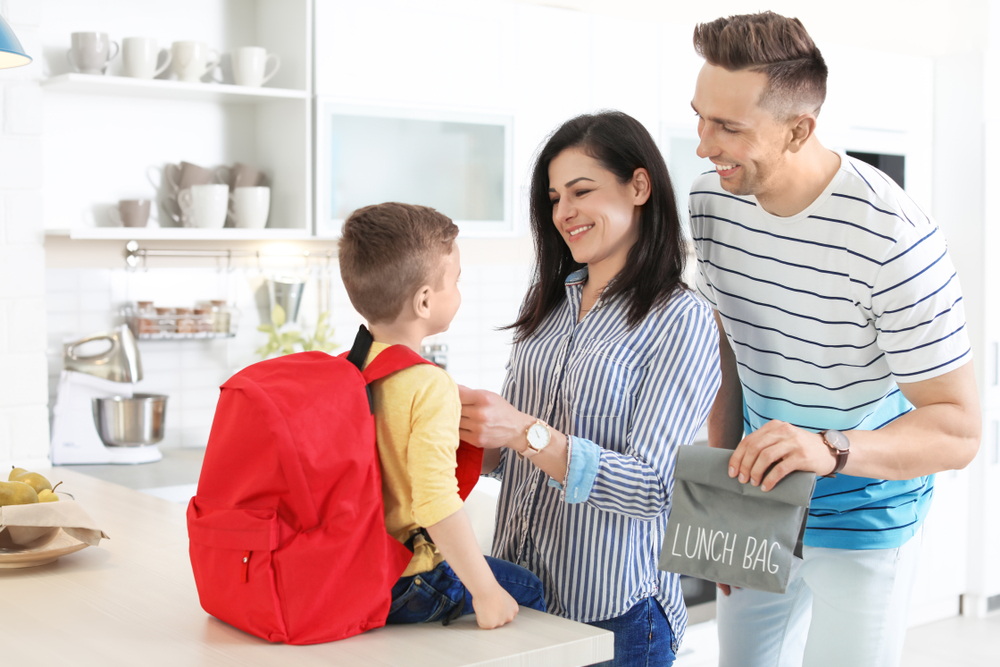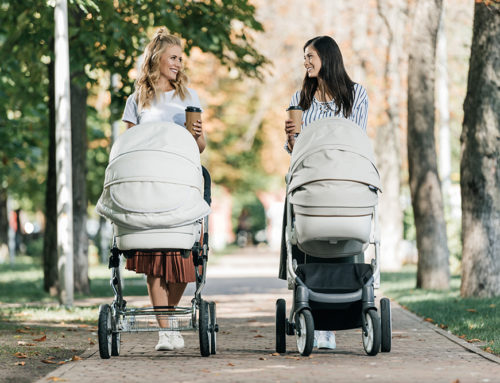Trading in beach bags for backpacks doesn’t come easy. A few weeks into the new school year and the novelty seems to have worn off a bit. While the first day began bright-eyed and bushy-tailed, some kids may be refusing to put on their shoes, eat their breakfast or even board the bus.
If your new student is having a slow start this September, don’t sweat it. Experts share their trusted tips for helping young children adjust to their new daily routine, so you can send them off with a smile.
Separation Anxiety to the Max
If you were hoping that your preschooler had outgrown his blankie, don’t be surprised if he suddenly demands to find it right before it’s time to drive him to school. Younger kids can have a particularly difficult time with change, especially if you’ve relaxed the rules during the summer. For parents wrestling with this behavior adjustment, let your child know that his frustrations and fears are being heard. “You will want to allow your child to express his feelings, meet those feelings with acceptance and empathy and then gently express positivity and belief in your child,” says Tom Limbert, an early childhood parenting consultant (www.parentcoachtom.com).
If your kindergartner loved riding the bus last week, but is now refusing to set foot inside it, try tabling a teachable moment for the time being and engage in what Limbert calls “emotional coaching.” “Afterwards…invite your child to come up with a plan that will help him feel more secure next time,” he offers. “Help your child label their emotions and discuss coping strategies to manage their anxiety.” Even young children can share what’s bothering them, so you can come up with a plan to make this experience easier for them next time.
Get Up and Go
Bedtimes are never easy for young kids, especially if you’ve been flexible with their sleep schedule over the last few months. For those that refuse to hit the hay even after tuck-in, it’s the perfect opportunity to reinforce the importance of a good night’s sleep—for everyone. “Allow your child to have some input, but remind her that she will have a better day if she is rested,” notes Limbert.
And if come morning, your sleepyhead is finding it hard to wake up, a healthy combination of empathy and limited choices is what’s in order. “You might say, ‘I know it’s hard to get out of bed sometimes; I feel that way, too,’” he suggests. “ ‘You’re just getting used to your new schedule and I know you can do it.’” If your child needs another minute, pose a question to get them going, such as ‘Do you want cereal or oatmeal when you come down to breakfast?’
Stay Organized
It’s amazing how quickly your kitchen can be overtaken by the sheer amount of paper that comes home in kids’ backpacks. To tame all that clutter before it gets out of hand, professional organizers recommend setting up a system in a central location. “Use stacking trays or a hanging file system with labels such as ‘inbox,’ ‘fill out/sign (urgent),’ ‘fill out/sign (non-urgent) and ‘completed,’” offers Katie Siefermann of Fall Into Place Organizing (www.fiporganizing.com). “You can also hang a bulletin board and/or white board in the same location to add visual reminders of important events and tasks,” she adds.
So that this seemingly endless paper flow doesn’t take over your home (and life), set a time to manage everything as it comes in and stick to it. “I go through mine when I make the kids’ lunches,” says Megan Ludvinsky, owner of About Space Organizing (www.aboutspaceorganizing.com), who involves her kids in getting papers put in the right place. “Integrating paper into your child’s routine helps everyone stay on the same page, and it’s a great lesson to teach your child early on,” she says.
Even with a set filing system in place, you may need to adjust things and see if the process is working. Siefermann suggests revisiting things on a weekly or monthly basis and doing a thorough clean-out at least once a month. But don’t get crazed if you fall behind in your filing. “Persistence is key,” notes Ludvinsky. “As they say, it takes 21 days to make or break a habit, and the same applies to organizing. Try a system consistently for three weeks and if it’s still not working, it may not be the right system for you.” She also recommends having a recycling bin within reach, so you can offload anything you don’t need immediately.




